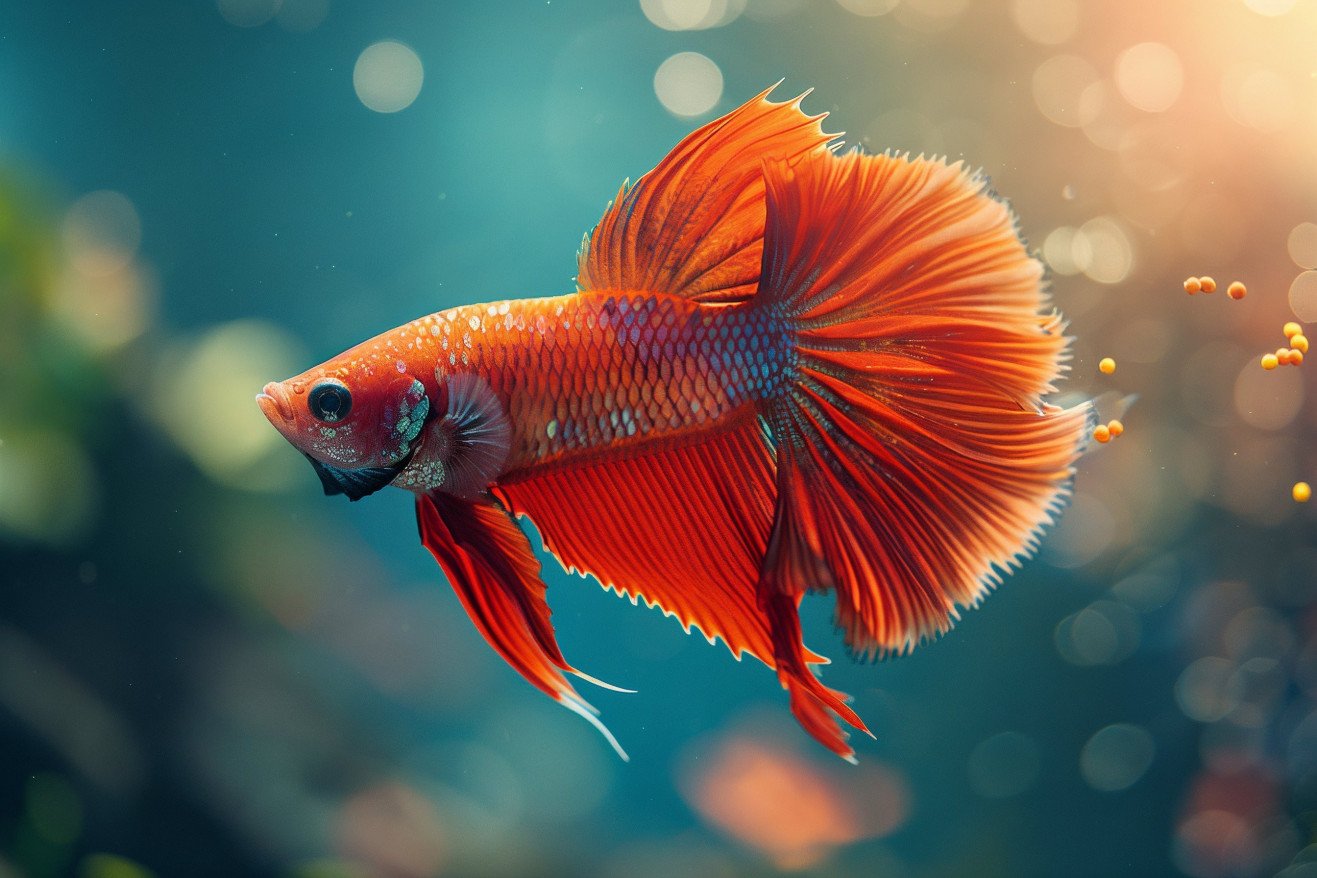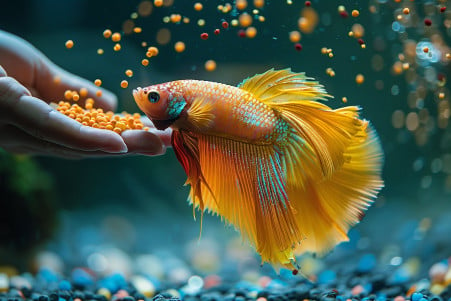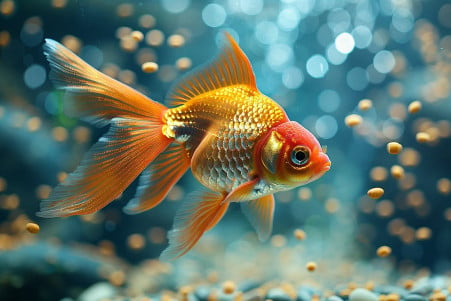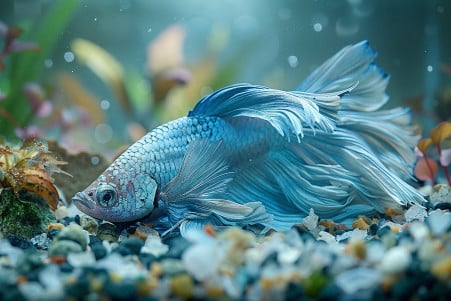Why Is My Betta Fish Not Eating? Reasons and Solutions for Your Fish’s Lack of Appetite
20 March 2024 • Updated 19 March 2024

If you’ve noticed that your betta fish has been refusing to eat, you’re probably feeling worried and confused.
There are a few reasons why your betta fish might not be eating, including stress, poor water quality, sickness, and even dietary issues.
Make sure that the water is at the right temperature (76–82°F), keep the tank clean, and make sure that the pH is at the right level. Make sure that you’re feeding your betta fish a varied diet and keep an eye on it for any signs of sickness. If your betta fish isn’t eating for more than a few days, make sure to take it to the vet.
In this deep dive into the topic of betta fish not eating, we’ll be looking at a wide range of interdisciplinary studies from veterinary science, aquatic animal husbandry, and fish nutrition. We’ll be covering research that looks at everything from behavioral trends and environmental factors that affect appetite to the most common diseases that can lead to a lack of appetite.
The best ways to care for fish. By the end of this comprehensive overview, you’ll have the knowledge you need to make sure that your betta fish is healthy and happy.
Why is my betta fish not eating?
Aggression and Its Impact on Feeding
In addition to their vibrant colors and flowing fins, betta fish also have another claim to fame: their aggression. This aggression is especially prevalent in males, and research by Columbia neurobiologist Andrés Bendesky has shown that this aggression is genetically hardwired in bettas, and therefore may impact their feeding behavior, according to Columbia Magazine.
Since betta fish are territorial, this often results in stress when their environment is changed, and this can lead to a loss of appetite, which is something that owners should be on the lookout for.
The social interactions that bettas experience throughout their lives are even more complex. A study in the journal Fishes found that there are neural responses to social competition that are important to consider when thinking about how stress can impact feeding. This shows that social interactions are important and can impact feeding.
The complexity of betta fish’s social lives is also important to consider. A study in BMC Zoology found that bettas that were raised in enriched environments were less aggressive, which could lead to better feeding and social tolerance. This means that if bettas are raised in an enriched environment, their feeding issues due to stress are less likely to occur.
All of these things are important for owners to consider when they’re trying to make sure that their betta fish are eating properly. By making sure that they’re in an enriched environment and understanding their social needs, betta owners can make sure that their fish are happy and healthy, reduce the impact of stress and its impact on feeding, and set them up for a successful life in their tank.
Water Quality and Betta Fish Health
Water quality is one of the most important factors in ensuring that betta fish are healthy and eating well. Bettaboxx notes that bettas prefer a pH of 6.0 to 7.6 and need water that is as close to their natural environment as possible, which is shallow and warm.
Water temperatures should be kept between 76 and 82 degrees Fahrenheit to avoid lethargy and loss of appetite in betta fish. Betta fish can be sensitive to chemicals like chlorine in tap water, so it’s important to use a water conditioner like Aqua Safe to ensure that the water is safe for your fish.
Water quality is also important in betta fish care, according to Adam Short. Short recommends that you test your betta’s water regularly using a reliable test kit like the API Freshwater Test Kit to make sure that the pH, kH, and gH levels (which measure alkalinity and general hardness) are where they should be for your betta’s health.
Poor water quality can lead to stress and a loss of appetite in betta fish, so this is another reason to make sure that you’re keeping up with regular water changes and other maintenance.
By following these recommendations, betta fish owners can ensure that their fish are in an environment that will help them eat well. Good water quality is also important for preventing health problems and making sure that your betta fish are as healthy as possible.
How to Help Your Betta Fish Overcome Feeding Problems
If your betta fish is not eating, it’s important to figure out the cause. It could be due to stress from moving to a new tank or an underlying health issue.
Betta Buddy recommends using acclimation techniques to help your new betta fish adjust and encourage feeding by minimizing disturbances and providing hiding spaces. Meanwhile, Aquarium Source recommends sticking to a regular feeding schedule to help your betta fish understand when it’s time to eat and avoid erratic feeding behaviors.
To prevent feeding problems in betta fish, it’s important to make sure you’re feeding your fish a well-rounded diet that includes high-quality pellets, live, and frozen foods. The Spruce Pets also recommends making sure you don’t overfeed your betta fish and that you’re feeding it fresh food that’s an appropriate size.
The best way to prevent long-term feeding problems in betta fish is to make sure you’re providing consistent care and to seek help as soon as you notice your fish isn’t eating.
If you’ve tried these approaches and your betta fish still isn’t eating and is showing other signs of illness, such as lethargy or a change in color, it’s important to contact a vet who specializes in fish care. In general, it’s important to stay vigilant about your betta fish’s behavior and how it responds to its diet to ensure it stays healthy.
Other Ways to Help Your Betta Fish Regain Its Appetite
If you notice that your betta fish is no longer eating, it could be a sign that something is wrong. There are a number of common betta fish diseases that can cause your fish to lose its appetite, including Ich, Velvet, and Dropsy.
According to FishLab, Ich is characterized by small white dots on the fish’s body, while Velvet looks like a gold or rust-colored dust on the fish. Dropsy is a bit easier to spot since it causes the fish’s belly to swell and its scales to stick out.
Bettafish.org explains that it’s important to recognize these symptoms as soon as possible because they are signs of disease, not just a lack of interest in eating.
One of the first things that Bettaboxx recommends is setting up a hospital tank. Not only will this help you treat your sick betta, but it will also help you isolate the disease and keep it from spreading to other fish.
It’s also important to make sure that you identify and treat any illnesses as soon as possible. Bettaboxx also notes that you should make sure to take the carbon out of your filters when you’re medicating the water. If you don’t, the carbon can absorb the medication, rendering it useless.
If you find that your betta fish is suffering from a more serious health issue that you can’t treat at home, make sure to take it to a vet that specializes in fish. This will ensure that the vet administers the right treatments, which will help your fish get better and start eating normally again more quickly.
That said, it’s important to remember that the sooner you catch and treat any health issue, the better. Make sure to keep an eye on your fish to catch any symptoms early.
How to Create the Best Diet for Your Betta Fish
Because betta fish are carnivores, their diet should be high in protein to simulate the insects and insect larvae they would eat in the wild. WebMD recommends feeding bettas high-protein pellets made specifically for bettas as their primary diet, with treats like brine shrimp and bloodworms. Overfeeding is a common issue, and to prevent digestive problems, Dr. Jessie Sanders says to feed your betta fish pieces of food no bigger than their eye.
To keep your betta fish healthy and prevent overfeeding, Bettafish.org recommends feeding your betta fish twice a day with 2–4 pellets or small amounts of live or freeze-dried food. As betta fish get older or if they have health issues, their dietary needs may change. For example, older or less active bettas may need to be slowly switched to food that is lower in fat and easier to digest.
To keep your betta fish interested in eating and ensure they get a variety of nutrients, Bettafish.org recommends feeding them a variety of food types. If your betta fish seems uninterested in their food, try offering them different types and watch their reaction to see what they seem most interested in.
This will not only keep your betta fish excited about mealtime, but it will also set them up for a lifetime of good health.
Key Takeaways to Help You Feed Your Betta Fish a Healthy Diet
In wrapping up our look at the complex world of betta fish care, it’s clear that there are many things that can impact a betta’s willingness to eat. Betta fish stress is most often caused by their own aggression or changes in their environment, with water quality—especially pH and temperature—coming in a close second.
Bacterial, fungal, and parasitic infections can also impact their health and their willingness to eat, as can boring or improper feeding schedules.
It’s definitely important to make sure that you’re doing everything you can to prevent these feeding issues by providing a healthy, stimulating environment and attentive care. Some of the most important things we’ve learned from our look at betta fish care are that bettas need a diet that’s high in protein, that they benefit from a diverse diet, and that it’s important to keep their tanks clean and well-maintained.
Ultimately, it’s important to make sure that you’re paying attention to your betta fish’s behavior and health. By doing that and committing to using the knowledge you’ve gained, you can make sure that you’re doing everything you can to keep these beautiful pets healthy and happy and help them thrive in your care.


